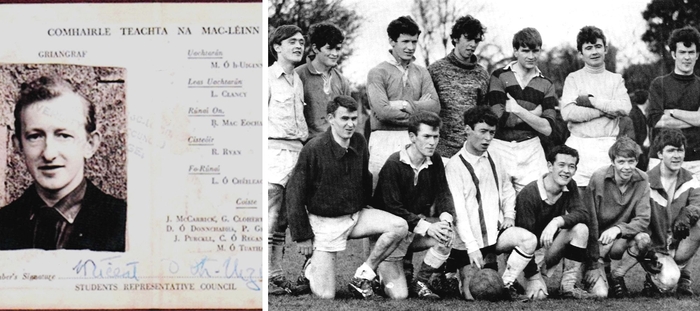The University College Galway Students' Union was originally established in 1911 as the Students' Representative Council. This council lasted only a short time but its reestablishment was proposed in 1913 and by the 1920s, it was firmly established. In the 1960s, it was formally developed into the University Students' Union, then known as Comhairle Teachta na Mac Leinn or CTM for short. It was formed in 1964, the function of the union as per the constitution was “to represent its members and promote, defend and vindicate the rights of its members at all levels of society.”
The first president was Michael D Higgins, as you can see from his membership card. They very quickly swung into action and organised some 600 students to march in protest at “The poor relations generally between the university and the local community” as many hotels refused to take visiting students, landladies discriminated against students in summer, etc. The protest started at the archway and finished at Seapoint.
Here are some of their activities over the years.
In 1970, 1,000 students protested over not being allowed to use the Aula Maxima during College Week for an intervarsity ballad competition. In 1971, a small reading room was taken away from students against the wishes of the student body and without authorisation of the governing body. This led to the occupation of the Common Room by 500 students and the suspension of three of them.
The union was affiliated to the Irish Council for Civil Liberties in 1978. From 1974 to 1978, the union ran and subsidised a crèche/nursery service for staff and students on Munster Avenue which they had to close down due to a lack of money, but they then started campaigning for the service to be funded by the college. By 1980, the union was pushing for on-campus accommodation for students and that year, they supported calls for political status for prisoners in Long Kesh and Armagh jails. In 1982, a catering boycott of the restaurant was held. Terms of settlement included a freeze on prices and an eight per cent increase in chip quantity. In 1985, they proposed the establishment of a student health service.

In 1988, sit-ins were held at the library regarding the cut in library hours, resulting in the necessary overtime for library staff being sanctioned. That year also it was “important that the emphasis for Rag Week be taken away from drink and the charity aspect stressed more.” Some years later, following RAG Week losses for three years, the union decided to revamp the week by running a small number of well-organised events with an increased emphasis on community involvement and charities. In 1994, Campus Watch was introduced due to safety concerns on campus. In 1997, they started a campaign (which succeeded ) to have the library open on Sundays. Also, that year, in return for the SU agreeing to support the passing of a referendum for an increase in capitation, the college agreed to install video cameras and extra lights on campus to improve security. In 1998/99, officers received training in suicide intervention. In 2000, they set up a stall outside the exam hall with Disprin, pens, calculators and exam stress leaflets.
Our second photograph shows part of a 1969 student march from Galway to Limerick. The carrying of a coffin was a dramatic gesture and helped raise a lot of funds. Our final image is of the student team that played against the staff team we showed you last week. It was all part of the fun of College Week. They are, back row; Seamus Bree, Gerry Kelly, Frank Flannery, Brian Ellis, Ken Garvey, Pat Rabbitte and Tony Flanagan. In front are Pat O’Neill, John Jennings, Seamus Brennan, Ian Tamplin, Ralph O’Gorman and Killian Roddy. There was an interesting mix of future politicians here – Pat Rabbitte of Labour, Seamus Brennan of Fianna Fáil and Frank Flannery who worked for the Fine Gael Party.
To celebrate their notable anniversary, the Students Union are inviting all former SU officers and staff members to a gathering this Saturday in the Sult at 6.30pm. Tickets are €15 and if you are interested, please contact [email protected].

